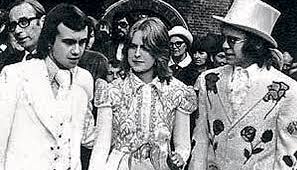And Now She's In Me, Always With Me

Bernie Taupin, Maxine Feibelman and Elton John. Tiny Dancer was originally dedicated to Feibelman by lyricist Taupin.
Watching the deeply moving performance given by a smitten Elton John and California-glowing Miley Cyrus in breathtaking dress at the Grammy Awards in NYC from here in Kula, I was inspired to revisit John's music, discovering for the first time how equally essential Bernie Taupin's lyrics are. In fact, these are, upon examination, amongst the most brilliant lyrics ever penned, in league with Cole Porter, Bob Dylan, or anyone else, and the same is true for John's music and realizations. Tiny Dancer, Rocket Man, Your Song, I'm Still Standing, Come Down In Time, and Bennie and the Jets are the songs from their collaboration that attract me most to date, finding them to be masterpieces. It would appear that this body of work is the closest we have to the songs from West Side Story by Leonard Bernstein and Stephen Sondheim by virtue of disavowing stuffiness and pretense in favor of an irresistible inner beat and syncopation coupled with urbanely inspired lyrics and melodies native to themselves and their milieu, England and America, respectively, without wasting energy copying the musical lives of others. Perhaps I will write more about the songs of John and Taupin on another occasion, including the former's ingeniously poignant and massively powerful harmonies, but I will note that Bennie and the Jets has a wonderfully original connection to the title track of the Sgt. Pepper's Lonely Hearts Club Band album, and how Tiny Dancer and Rocket Man both reimagine, in relative miniature, the elusively rarified modus operandi found on the second side of the Abbey Road album. Did you know that John Lennon stated when Your Song first came out that it was for him the first truly original rock music heard following the Beatles, or that John's prime musical influence, clearly discernable in Come Down In Time, was likely Laura Nyro? Mostly though, here, I wish to focus on telling words from Tiny Dancer. Not being the best at deciphering lyrics when they are sung, I am grateful for the internet whereupon such study is made possible. And now she's in me, always with me. Tiny Dancer may be my absolute favorite from the John and Taupin oeuvre. The words above, so potent in the context of the song, have additional resonance. They hearkened me back to my beginning studies of Indian classical music with Harihar Rao, and how imposing and mysterious everything seemed. In fact, there is a least one major college I know of where they decided not to include any teaching of Indian classical music because it was deemed too difficult for student comprehension.
It wasn't enough for me to simply learn technical elements of Indian classical music. I was equally driven to uncover the elusive meaning of the practitioner's expression so that it made sense to me emotionally, intellectually, spiritually, and physically, too. What happens has to do with an awareness of how body and mind intersect within the context of our existence in the world seen and unseen. In terms of music, this is about translating impulses we feel and imagine into intelligible sound, including melody, rhythm, color, texture, dynamics, articulation, form, and expression. Our manner of expression may be thought of as the all-encompassing ether since it entails all the other components. Central to my studies was gradually figuring out ways to assimilate my personal experience of Indian classical music's technical and expressive elements into my compositions and performances. Form is content as deployed, content is form as imagined. This profound insight of Helen Vendler is central to all music, too. Getting back to the borrowed title of this essay, after all my studies of Indian classical music, which continue, of course, I feel very fortunate to realize that this miraculously deep and rich tradition has been in me for some time, and is always with me. Part of this is because ragas are living embodiments of Nature, with all Her countless variations being the setting for our lives. Separation from either the beloved or God, an elemental narrative of Indian classical music, informs the cinematic yearning of Tiny Dancer as well. In case you missed it, here is Elton John performing as a sideman with T. Rex in musical and sartorial splendor. Is part of the uniqueness of the music of Bach, Beethoven, and other European masters of their time related to the relatively unspoilt state of Nature then? Yes, absolutely. Musicians and composers of our time are tasked with creating beauty within the continuing assaults upon Nature, which is synonymous with God or Music.
Pandit Jasraj and Michael Robinson Pandit Jasraj once told me that above all, God loves Music. I doubt that any of us do not love either Music, Nature, or God, and perhaps viewing all of these as One will be a help towards saving Earth for ourselves and those who follow. - Michael Robinson, February 2018, Kula, Maui
© 2018 Michael Robinson All rights reserved
Michael Robinson is a Los Angeles-based composer and writer (musicologist). |